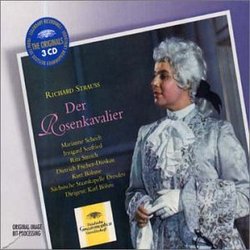| All Artists: Richard [1] Strauss, Karl Böhm, Dresden Staatskapelle, Hermi Ambros, Kurt Böhme, Dietrich Fischer-Dieskau, Helmut Goldmann, Edith Hellriegel, Johannes Kemter, Harald Neukirch, Albrecht Peter, Marianne Schech, Irmgard Seefried, Ilona Steingruber, Rita Streich, Fred Teschler, Gerhard Unger, Sieglinde Wagner, Rudolf Francl Title: R. Strauss: Der Rosenkavalier Members Wishing: 1 Total Copies: 0 Label: Dg Imports Release Date: 7/16/2002 Album Type: Box set, Import Genre: Classical Style: Opera & Classical Vocal Number of Discs: 3 SwapaCD Credits: 3 UPC: 028946366820 |
Search - Richard [1] Strauss, Karl Böhm, Dresden Staatskapelle :: R. Strauss: Der Rosenkavalier
 | Richard [1] Strauss, Karl Böhm, Dresden Staatskapelle R. Strauss: Der Rosenkavalier Genre: Classical
|
Larger Image |
CD Details |
CD ReviewsAt Last! Sean Coxen | Hyattsville, MD United States | 08/24/2002 (5 out of 5 stars) "I've been waiting many years for this "Rosenkavalier" to appear on CD; it has long been my favorite despite some imperfections. When this recording first appeared in the late 1950's, it was not greeted with deafening enthusiasm. First of all, it came hard on the heels of two classic sets -- Kleiber's 1955 and Karajan's 1957 releases. Second, it offered an unglamorous Marschallin plus a distictly un-Viennese flavor (most of the musicians are Dresden-based, though the main singers are more redolent of Munich), nor did it field a supporting cast peppered with star turns and clever references to Straussian performance history. This seems to be the magic recipe, for Decca followed it again to the letter and released another classic headed by Solti in 1970.It seems a shame that a "standard recipe" would overshadow Bohm's excellent offering when it gives so much pleasure. Bohm's incandescent, bouyant conducting of the superb Dresden Staatskapelle imbues the score with plenty of 'Schwung' and zero 'Schmalz', exactly right. His cast is also brilliant. Marianne Schech is not the steadiest or most sensuous of Marschallin's, but she is often a touching one who makes much of the text, especially at the end of Act 1. Here, she reveals an inner sadness, yet there is not a trace of self-asorption, an indulgence that ruins many an otherwise fine Marschallin. In Act 3 she is womanhood itself. Her tone may require some patience, but the patience will pay off.The remainder of the cast needs no special defense: Irmgard Seefried is arguably the loveliest of Octavian's, and surely the most impulsive; Rita Streich wins us over with a delightful, impeccably sung Sophie; Fisher-Dieskau shatters convention by making Faninal a dashing figure, really singing the part without sacrificing any of its theatrical impact; and Kurt Bohme's Ochs, so much admired by Strauss himself, proves one of the definitive portayals: his big gruff voice exhibits a remarkable agility in both the tough musical demands and rich comic inflections required of the part. The capable supporting cast includes Gerhard Unger and Sieglinde Wagner, a superb pair of plotters, and Rudolf Francl, an adequate Italian Singer. The score is presented note-for-note complete.It should also be noted that the early stereo sound is not the equal of DG's other stereo efforts of similar vintage, but this can be easily overlooked once the listener becomes involved in so fabulous a show." Betwitxt and between, but well worth a listen Santa Fe Listener | Santa Fe, NM USA | 04/09/2008 (4 out of 5 stars) "When DG did their special series of Strauss operas conducted by Bohm, they passed over this studio effort in favor of a starry live performance from Vienna. The five-star reviewer here has given an honest advocacy of a version that has long been an also-ran. He puts the best possible light on the style, which is rather sharp and brisk rahter than meltingly Viennese. The Marschallin, Marianne Schech, is a sesoned professional who knows the part inside out, but her homely soprano sounds about the same age and timbre as Seefried's Oktavian, itself a soprano instead of the expected mezzo -- there's a lack of differene between the two singers. Schech is often the more "masculine," that is, sharp, impulsive, and edgy. That said, this is a very appealing Rosenkavalier for all the reasons given by its advocate. It's treasurable, for one thing, to have the Sophie of Rita Streich, the preeminent German coloratura of the Fifties. The recorded sound is vintage LP-era analog (allowing for some microphone shatter when the voices press hard), and overall I felt comfortable inside this assured reading, so redolent of a lost era in German opera houses." The best-ever Rosenkavelier recording Eric Zuesse | USA | 03/27/2010 (5 out of 5 stars) "If you want a Rosenkavelier that bubbles along with joy and that captures the touching quiet passages in a way that conveys the compassion and the ripe 1910 Vienna character of this work, then there really is no other recording that's even worth considering.
What especially distinguishes this performance above all others is the steady pulse and the waltz swing/sway from start to finish. Thus, unlike in any other recording, this opera is fully engaging throughout. Bohm conducts with vivacious grace. All of the soloists are superb, and the Dresden Staatskapelle (an orchestra which Strauss and Bohm both loved) plays like a slightly brighter-sounding version of the Vienna Philharmonic. There's nothing of the sentimentality of Solti's conducting, and little of the dark character of the Karajan-Vienna or of the Krauss-Munich performances. Bohm's great advantage over the Karajan-Philharmonia is a steadier tempo, and a more Viennese lilt. Strauss's favorite conductors of his music were Bohm and Krauss; and I think that this Bohm recording would be the one that he would listen to the most-often. Perhaps the reason Bohm never recorded another performance of the work is that this one was too good. Nobody could out-do it; not even Bohm." |

 Track Listings (33) - Disc #1
Track Listings (33) - Disc #1